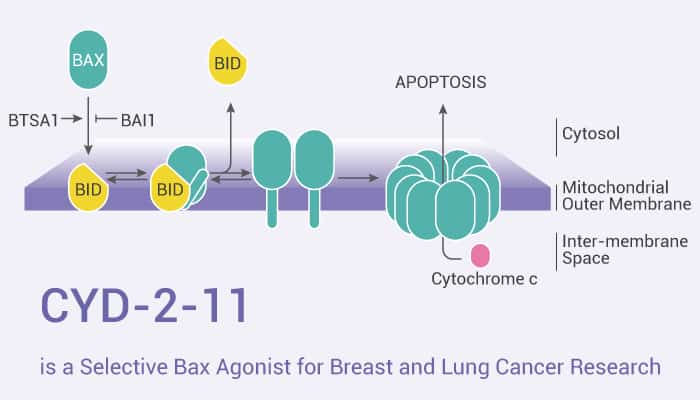Bax, an important regulator of cell death is expressed in essentially all organs. Also, Bax is a member of B-cell lymphoma 2, it is involved in the apoptosis of normal and cancer cells. The mitochondrial pathway is the intrinsic pathway that leads to apoptosis. Importantly, activation of Bax induces mitochondrial membrane permeability. Thereby resulting in the release of the apoptotic factor cytochrome c. Eventually, the cancer cells die. For this reason, Bax has attracted a lot of attention due to its great potential in cancer treatment. Until now, many studies have shown that the Bax level is closely related to cancers, including lung cancer, chronic lymphocytic leukemia (CLL), breast cancer, and others. Here, we will introduce a selective Bax agonist, CYD-2-11.
CYD-2-11 is a selective Bax agonist with antitumor activities.

CYD-2-11 is an analog of SMBA1. SMBA1, a small molecular Bax agonist. Due to the excellent chemical properties, SMBA1 is selected as the leading compound. Therefore, CYD-2-11 is generates based on the refinement, molecular docking, chemical structure analysis and modification of SMBA1.
As the experiment results in vitro, CYD-2-11 significantly inhibits breast cancer cells proliferation. CYD-2-11 inhibits proliferation of T47D, MCF-7, MDA-MB-231, MDA-MB-468 and MCF-10A cells with IC50 values of 3.22-9.47 μM. Besides, CYD-2-11 induces cell apoptosis of SCLC and NSCLC with a better effect than SMBA1. What’s more, CYD-2-11 shows antineoplastic activity in vivo. CYD-2-11 inhibits the growth of lung cancer and breast cancer in mouse tumor models.
Above all, CYD-2-11 is a selective Bax agonist with cell apoptosis inducing effects. Most important of all, CYD-2-11 has a strong antitumor activity in vivo and in vitro.
References:
[1] Liu Z, et al. Med Res Rev. 2016 Mar;36(2):313-41.
[2] Li R, et al. Cancer Res. 2017 Jun 1;77(11):3001-3012.